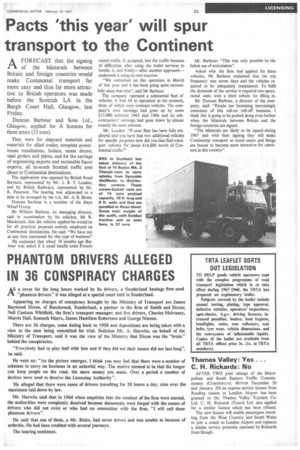Pacts 'this year' will spur transport to the Continent
Page 35

If you've noticed an error in this article please click here to report it so we can fix it.
AFORECAST that the signing of the bilaterals between Britain and foreign countries would make Continental transport far more easy and thus far more attractive to British operators was made before the Scottish LA in the
Burgh Court Hall, Glasgow, last Friday.
Duncan Barbour and Sons Ltd., Glasgow, applied for A licences for three artics (33 tons).
They were for shipyard materials and materials for allied trades, complete powerhouse installations, boilers, steam drums, steel girders and plates, and for the carriage of engineering exports and exciseabie liquor exports, all ex-south Scottish traffic area direct to Continental destinations. •
The application was opposed by British Road Services, represented by Mr. J. B. T. Louden, and by British Railways, represented by Mr. R. Paterson. The hearing was adjourned to a date to be arranged by the LA, Mr. A. B. Birrtie.
Duncan Barbour is a member of the Hays Wharf Group.
Mr William Barbour, its managing director, said in examination by his solicitor, Mr R. Mackenzie, that the vehicles applied for would be for all practical purposes entirely employed on Continental destinations. He said: "We have not at any time canvassed for this type of business".
He explained that about IS months ago Barbour was asked if it could handle some French
round traffic. It accepted, lost the traffic because of difficulties after using the trailer services to handle it, and finally—after another approach— undertook it using its own traction.
"We embarked on this operation in March of last year and it has been going quite successfully since that time", said Mr Barbour.
The company operated a substantial fleet of vehicles. It had 44 in operation at the moment, three of which were contract vehicles. The company's own earnings had gone up by some £15,000 between 1965 and 1966 and its subcontractors' earnings had gone down by almost exactly the same amount.
Mr. Louden: "If your fleet has been fully employed and you have had two additional vehicles for specific purposes how did you then find transport vehicles for about £14,000 worth of Continental traffic?" Mr. Barbour: "This was only possible by the fullest use of articulation".
Asked why the firm had applied for three vehicles, Mr Barbour explained that the trip frequency was seven days and the vehicles required to be adequately maintained. To fulfil the demands of the service it required two operational units with a third vehicle for filling in.
Mr Duncan Barbour, a director of the company, said: "People are becoming increasingly conscious of this roll-on roll-off business. I think this is going to be. pushed along even further when the bilaterals between Britain and the foreign countries are signed.
"The bilaterals are likely to be signed during 1967 and with their signing they will make Continental transport so much easier and things are bound to become more attractive for operators in this country".












































































































